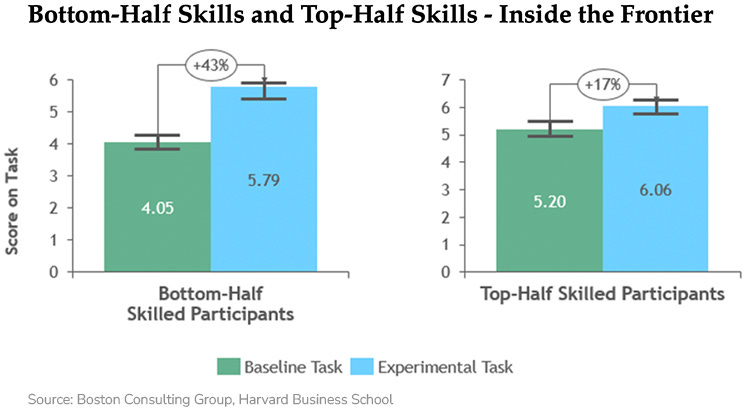AI & the Future of Workforce Development
What a research paper published this week tells us about the potential impact of AI on how we teach & train the workforce (and where we need to start)
A study by Boston Consulting Group, Harvard Business School & Massachusetts Institute of Technology into the impact of ChatGPT on efficiency and effectiveness was published earlier this week.
The study, based on the workplace performance of 758 consultants from BGC’s offices around the world, found that the use of ChatGPT in the flow of work:
increased the quality of the work done by an average of 30%
increased the quantity of the work done, increasing the rate of task completion by 25%
“It’s truly remarkable to consider that these consultants, many of whom hold MBAs from elite institutions, could enhance their performance on realistic business tasks to such an extent.”
Report co-author Fabrizio Dell’Acqua, postdoctoral research fellow at Harvard Business School
AI: a Revolution for Low-Skilled Workers?
What’s perhaps most exciting, is the fact that the report found that the impact of ChatGPT was significantly higher for “lower skilled” workers.
The consultants with below average performance saw their performance improve by 43% when they used AI, while those in the higher performing category improved by 17%.
This is not the first time that a study has showed that generative AI is less useful for skilled and capable workers. A previous study, for example, found that highly-skilled workers saw nearly no improvement in their performance when using Gen AI.
Implications: the Future of Workforce Development
The findings from the study on the impact of ChatGPT on workplace performance provide valuable insights into the potential of AI in upskilling the workforce.
Here's my take on what these findings could mean for the future of workforce development:
Targeted Up-skilling for Below-Average Performers: The fact that "lower skilled" or below-average performers benefited more significantly from ChatGPT suggests that AI tools can be particularly effective in up-skilling this segment of the workforce. Organisations should prioritise introducing AI tools to employees who are lower skilled and/or struggling most, as this could lead to more substantial performance gains.
Levelling the Playing Field: The disproportionate benefit to lower-skilled workers means that AI has the potential to level the playing workplace field. By boosting the performance of those who are lagging, organisations can achieve a more uniformly skilled workforce, reducing disparities in performance.
Customised Learning Paths: The differential impact of ChatGPT based on skill level underscores the importance of personalised learning. AI tools can be designed to assess an individual's current skill level and provide tailored recommendations, resources, and support to help them improve.
Enhancing Productivity and Efficiency: The increase in both quality and quantity of work suggests that AI can be a valuable tool for enhancing overall workforce productivity. As employees become more efficient and produce higher-quality work, organisations can achieve better outcomes with the same or even fewer resources.
Redefining Roles and Responsibilities: As AI tools boost the performance of lower-skilled workers, there might be a shift in how tasks and responsibilities are allocated. Tasks that were once reserved for higher-skilled employees might be redistributed, allowing for a more flexible and dynamic workforce.
Addressing the Skills Gap: One of the significant challenges many industries face is the skills gap, where there's a mismatch between the skills employees possess and the skills required for the job. The findings suggest that AI can be a powerful tool in bridging this gap, especially for those who are currently underperforming.
Building Confidence and Morale: For below-average performers, consistent underperformance can be demoralising. The significant boost in their performance with the aid of AI can lead to increased confidence, motivation, and overall job satisfaction, leading to better retention and a more positive workplace environment.
Future of Training Programs: Traditional training programs might need to be re-evaluated in light of these findings. Instead of generic training modules, the focus might shift to AI-driven, real-time, on-the-job training that provides immediate value and applicability.
The findings from BCG’s study highlight the transformative potential of AI in the workplace.
By targeting interventions based on individual skill levels and integrating AI tools into the daily workflow, organisations can achieve significant improvements in performance, productivity, and overall workforce development.
Happy innovating!
Phil 👋
PS: I am running a research project to test the impact of AI on the efficiency and effectiveness of L&D teams. Want to apply to take part? Learn more & apply here!
,


